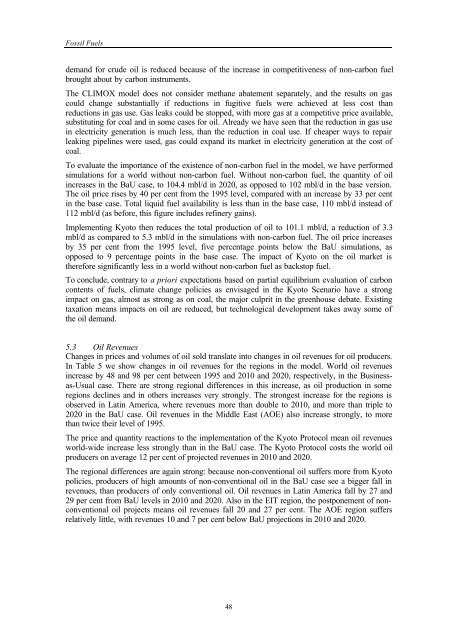sectoral economic costs and benefits of ghg mitigation - IPCC
sectoral economic costs and benefits of ghg mitigation - IPCC
sectoral economic costs and benefits of ghg mitigation - IPCC
You also want an ePaper? Increase the reach of your titles
YUMPU automatically turns print PDFs into web optimized ePapers that Google loves.
Fossil Fuels<br />
dem<strong>and</strong> for crude oil is reduced because <strong>of</strong> the increase in competitiveness <strong>of</strong> non-carbon fuel<br />
brought about by carbon instruments.<br />
The CLIMOX model does not consider methane abatement separately, <strong>and</strong> the results on gas<br />
could change substantially if reductions in fugitive fuels were achieved at less cost than<br />
reductions in gas use. Gas leaks could be stopped, with more gas at a competitive price available,<br />
substituting for coal <strong>and</strong> in some cases for oil. Already we have seen that the reduction in gas use<br />
in electricity generation is much less, than the reduction in coal use. If cheaper ways to repair<br />
leaking pipelines were used, gas could exp<strong>and</strong> its market in electricity generation at the cost <strong>of</strong><br />
coal.<br />
To evaluate the importance <strong>of</strong> the existence <strong>of</strong> non-carbon fuel in the model, we have performed<br />
simulations for a world without non-carbon fuel. Without non-carbon fuel, the quantity <strong>of</strong> oil<br />
increases in the BaU case, to 104.4 mbl/d in 2020, as opposed to 102 mbl/d in the base version.<br />
The oil price rises by 40 per cent from the 1995 level, compared with an increase by 33 per cent<br />
in the base case. Total liquid fuel availability is less than in the base case, 110 mbl/d instead <strong>of</strong><br />
112 mbl/d (as before, this figure includes refinery gains).<br />
Implementing Kyoto then reduces the total production <strong>of</strong> oil to 101.1 mbl/d, a reduction <strong>of</strong> 3.3<br />
mbl/d as compared to 5.3 mbl/d in the simulations with non-carbon fuel. The oil price increases<br />
by 35 per cent from the 1995 level, five percentage points below the BaU simulations, as<br />
opposed to 9 percentage points in the base case. The impact <strong>of</strong> Kyoto on the oil market is<br />
therefore significantly less in a world without non-carbon fuel as backstop fuel.<br />
To conclude, contrary to a priori expectations based on partial equilibrium evaluation <strong>of</strong> carbon<br />
contents <strong>of</strong> fuels, climate change policies as envisaged in the Kyoto Scenario have a strong<br />
impact on gas, almost as strong as on coal, the major culprit in the greenhouse debate. Existing<br />
taxation means impacts on oil are reduced, but technological development takes away some <strong>of</strong><br />
the oil dem<strong>and</strong>.<br />
5.3 Oil Revenues<br />
Changes in prices <strong>and</strong> volumes <strong>of</strong> oil sold translate into changes in oil revenues for oil producers.<br />
In Table 5 we show changes in oil revenues for the regions in the model. World oil revenues<br />
increase by 48 <strong>and</strong> 98 per cent between 1995 <strong>and</strong> 2010 <strong>and</strong> 2020, respectively, in the Businessas-Usual<br />
case. There are strong regional differences in this increase, as oil production in some<br />
regions declines <strong>and</strong> in others increases very strongly. The strongest increase for the regions is<br />
observed in Latin America, where revenues more than double to 2010, <strong>and</strong> more than triple to<br />
2020 in the BaU case. Oil revenues in the Middle East (AOE) also increase strongly, to more<br />
than twice their level <strong>of</strong> 1995.<br />
The price <strong>and</strong> quantity reactions to the implementation <strong>of</strong> the Kyoto Protocol mean oil revenues<br />
world-wide increase less strongly than in the BaU case. The Kyoto Protocol <strong>costs</strong> the world oil<br />
producers on average 12 per cent <strong>of</strong> projected revenues in 2010 <strong>and</strong> 2020.<br />
The regional differences are again strong: because non-conventional oil suffers more from Kyoto<br />
policies, producers <strong>of</strong> high amounts <strong>of</strong> non-conventional oil in the BaU case see a bigger fall in<br />
revenues, than producers <strong>of</strong> only conventional oil. Oil revenues in Latin America fall by 27 <strong>and</strong><br />
29 per cent from BaU levels in 2010 <strong>and</strong> 2020. Also in the EIT region, the postponement <strong>of</strong> nonconventional<br />
oil projects means oil revenues fall 20 <strong>and</strong> 27 per cent. The AOE region suffers<br />
relatively little, with revenues 10 <strong>and</strong> 7 per cent below BaU projections in 2010 <strong>and</strong> 2020.<br />
48
















